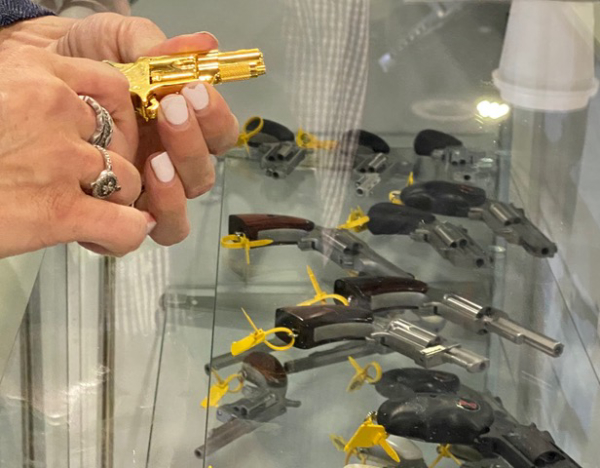Thursday, the Biden Administration rolled out a continuation of their efforts to restrict firearms and ownership rights via their favorite backdoor method: changing definitions to suit political whims.
This time, they’ll institute a re-interpretation of the ATF definition of what constitutes a “licensed firearms dealer.” That’s despite the comment period for the proposed “reinterpretation” having generated more than 300,000 overwhelmingly negative responses.
The stated goal is to close the “gun show loophole.” That mythical “loophole” will be closed via a significant broadening of the definition of what constitutes being engaged in the business of selling guns.
The PR wing of the Justice Department is floating (via mainstream media) the “fact” there are now an estimated “more than twenty-three thousand” unlicensed gun dealers in America. They also admit their “predictions” are “imprecise.”
The expanded definition doesn’t quantify what changes an individual from legal to illegal; it does say any individual who repeatedly sells weapons to “predominantly earn a profit” must now obtain a federal firearms license and do background checks on buyers.

Here are three “hints” they say will cause scrutiny: 1) purchasing online ads, 2) record keeping, and, 3) operating a credit card system.
I have never advertised anything firearms related online. But I have used eBay to sell watches and cameras in the past. That’s one “hint” avoided.
However… the NRA Personal Firearms Record books I’ve maintained for the past two decades are going away. They contain lists of the guns I’ve owned/sold or tested since beginning the wires. A one-sheet inventory of what I own -today- will suffice for insurance purposes. Otherwise, I run a risk, although admittedly small, of triggering a “hint”
If you’re like me and have the Square (or Melio or Wave) app on your phone, you also have the ability to accept a credit card payment.
That’s two of the three “suspicions” confirmed.
Anyone at our next neighborhood yard sale will need to have cash. No cards accepted.
There are a couple of carve-outs that won’t require a background check: private transfers between family members and/or liquidation of a personal collection without restocking.
The definition of “restocking” isn’t defined, but the exuberance of the current administration to enforce any rule that restrains gun rights would indicate that there’s little hesitation to go in extremis to say that selling your gun (s) means there no firearms in your future. Otherwise, you run the chance of meeting the definition of a dealer “restocking.”
Attorney General Merrick Garland issued a statement calling the regulation a “historic step” that will “save lives”. The statement goes on to say that federal “data” says illegal or black-market (that’s potentially a new working definition for “personal sales”) are “increasingly found at shooting scenes.” Of course, that “scary fact” is in no way quantified.
Without quantification “increasingly found” is a rubber ruler. After all, increasing something from 1 to 2 constitutes a statistical “doubling.”
Garland’s statement was quick to explain the new regulation will not impact existing licensed firearms dealers. Instead, it says, the new regulation will “bring unlawful dealers into compliance with federal law.”
That’s not exactly accurate. Via the casting of a very broad net, it leaves room for lots of interpretation. That’s what imprecise regulations always do.
It creates the potential for innocent individuals in find themselves in legal entanglements along with the measure’s alleged targets: unlicensed gun dealers.
In commercial fishing, that’s called “bycatch.”
In an administration that has been at war with gun manufacturers and owners since its inception, the military definition is probably more appropriate: “collateral damage.”
Granted, that sounds like superheated political rhetoric. Unfortunately, a preponderance of evidence supports the assertion of bad intent. The evidence includes the words of the President and his ATF appointees.
Real scientific studies on the effects of background checks on violent crime say evidence that dealer background checks reduce firearm homicides is - at best - moderate.
The government isn’t about to reference examples where background checks were most effective.
They were in states where checks included checks on mental illness, restraining orders and fugitive status. That’s because crazies, criminals and fugitives don’t fit the narrative -they weaken it.
We are naive to believe politicians are going to eagerly go to bat for us on this one.
Pro and anti-gun politicians are in lockstep when it comes to the avoidance of raising the idea of mental illness in America. They have consistently approved measures that defunded mental health care.
That defunding has played a major part in creating a national mental health crisis that is real, tangible and provable.
Guns aren’t the cause for horrible events.
They’re just the most effective tool for criminals and crazies.
Unfortunately, politicians don’t want to address that fact. Instead, they “take action” against people who listen: law-abiding citizens. Apparently, they’re wishing for some sort of “trickle down” effect on very the real problems of crime and mental health.
There’s an acronym used by members of the military when they see another bad decision headed their way: BOHICA.
It’s appropriate here, too.
We’ll keep you posted.
— Jim Shepherd
Editor’s Note: Illegal gun sales isn’t the real problem. In his assessment of the third edition of the ATF’s Trafficking Report in our companion service Shooting News Weekly, the NSSF’s Larry Keane demonstrates how the administration simply ignores that fact while trumpeting “zero tolerance” policies against FFL licensees.
